![]()
The Words of the Yong Family
|
|
The Words of the Yong Family |
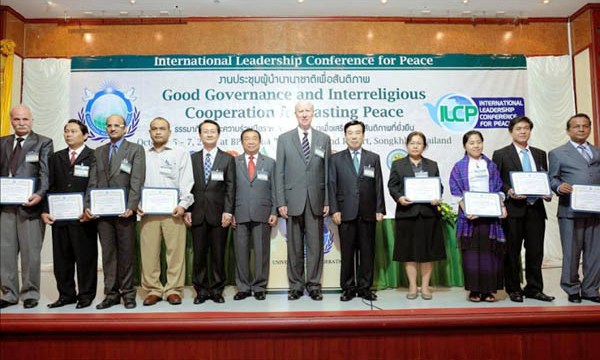
Songkhla, Thailand – Separatist violence has occurred for decades in the three southernmost provinces of Thailand, and the campaign escalated in January 2004. In addition to the legal and operational control mechanism and regional cooperation through intelligence information exchange, efforts such as cultural and religious approaches should be an area of focus, along with promoting good governance followed by a balanced national development.
UPF-Thailand and UPF chapters in Asia, under the supervision of Dr. Chung Sik Yong, Regional Chair of UPF-Asia, took a step forward to peace with an International Leadership Conference for Peace on the topic "Good Governance and Inter-religious Cooperation for Lasting Peace." The Conference was held October 5 to 7 in Songkhla province, the gateway to the three southernmost provinces of Thailand near the border with Malaysia.
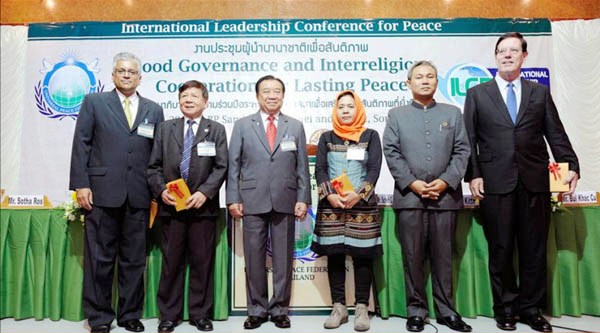
The proceedings, held at the BP Samila Beach Hotel and Resort in Songkhla, brought together 350 participants from 21 nations including Buddhist, Christian, Muslim, Hindu, and Sikh religious leaders, scholars of religion, diplomats, and political and community leaders.
Together with UPF, the official co-hosts for the conference were UNESCO, the National Assembly of Thailand, King Prajadhipok's Institute of the Parliament of Thailand, the Southern Border Provinces Administration Center, the Government of Songkhla, the Songkhla Provincial Administrative Organization, and the Songkhla Municipality. Moreover, the Royal Thai Police and the government's Internal Security Operations Command of Region 4 sent security officers to help with security during the conference. The conference also received financial support from private organizations such as T. Krungthai Industries Public, Ltd., and Wongphanit Suvarnabhumi Recycle Station.
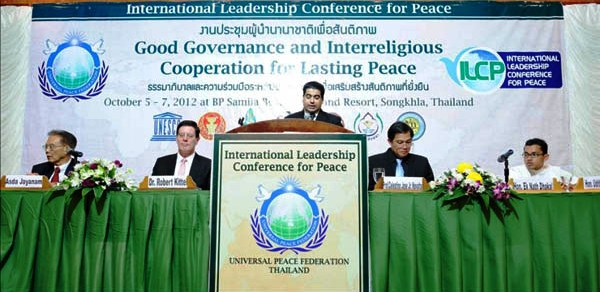
Because the conference was the first international program of UPF-Asia since the demise of Rev. Dr. Sun Myung Moon, Founder of UPF, participants from 21 nations opened the conference with a minute of silence to commemorate Father Moon.
In the Opening Ceremony, religious leaders from five religions: Buddhism, Islam, Christianity, Hinduism, and Sikhism, offered invocations, followed by welcoming remarks by Mr. Surapol Panusampol, Songkhla's Vice Governor, and Dr. Yong, and finally the opening remarks from Dr. Thomas G. Walsh, President of UPF International. Since top leaders of UPF, were present, all participants could be warmly welcomed to the conference with the common spirit of UPF as one family.
Gen. Charan Kullavanijaya, President of the Assembly of Buddhist Organizations of Thailand, President of the Foundation of the Think Tank of the National Defense College and and former Secretary-General of the Thailand National Security Council, was invited to give the keynote address. Gen. Charan spoke about Thai views on good governance which requires at least six points: 1) Legitimacy, 2) Transparency, 3) Participation, 4) Accountability, 5) Effectiveness, and 6) Righteousness. Education for clear understanding and good cooperation among people through religious virtues should be strengthened. That will help promote peace in all societies. "It is my belief that all religions teach virtues to people. The most important thing is then to promote clear knowledge of those religious virtues and their application," Gen. Charan said.
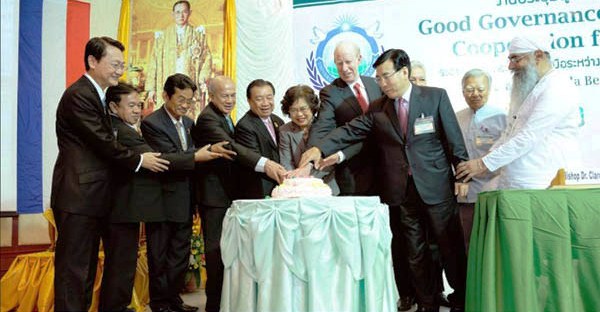
The conference was composed of five plenary sessions: 1) The Role of Leaders in Good Governance for Peace, 2) The Role of Inter-religious Cooperation in Peace Building, 3) The Situation in Southern Thailand: Problems and Solutions, 4) Innovative Approaches to Peace, and 5) How to Strengthen Families as Foundation for Peace. The core education about UPF was given by UPF lecturers Dr. Robert Kittel, Director of Education of UPF-Asia, and Mrs. Ursula McLackland, Secretary General of UPF-Asia. Most of the participants, especially the more than 200 Thai participants who were mainly Buddhists and Muslims, were moved and inspired by the UPF presentations. Since speakers in each session were high-level figures in their fields: ministers, Members of Parliament, religious leaders, government officers, etc., especially Hon. Ek Nath Dhakal, President of UPF-Nepal who became the Minister of Cooperatives and Poverty Alleviation, they also gave very interesting and useful presentations that attracted participants who filled the hall almost every session.
On the first day, there was a special program commemorating the first anniversary of the Inter-religious Peace Council in Thailand, with Rev. Kamol Thananopavarn, President of the Family Federation for World Peace-Thailand, served as MC. Under the leadership of Gen. Terdsak Marrome, President of UPF-Thailand, and Dr. Lek Thaveetermsakul, Secretary General of UPF-Thailand, representatives of the major religions in Thailand, Buddhism, Islam, Christianity, Hinduism, and Sikhism, had spent a year discussing and working together and finally joining hands to inaugurate the council on September 21, 2011 in Bangkok with the direct support of the Minister of Culture, His Holiness the Supreme Patriarch of Buddhism of Thailand, the Sheikhul of Islam of Thailand, etc. Therefore, one year after the inauguration, all participants jointly celebrated it with much joy.
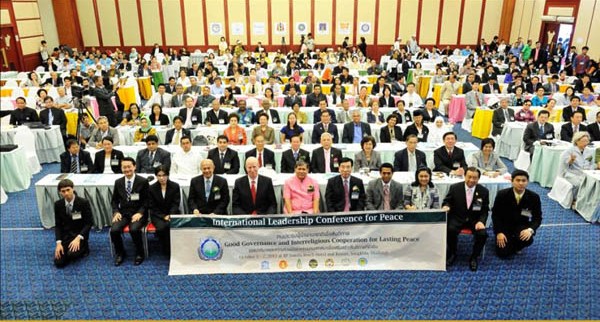
UPF's conference in Songkhla was the first international conference in the region with a large number of participants that addressed the problems of the three southernmost provinces of Thailand and proposed peaceful solutions. Mr. Peera Tantiseranee, Mayor of Songkhla, was inspired by this initiative and international cooperation of UPF. At the end of the first day of the conference, the Songkhla Municipality sponsored the welcoming banquet and presented gifts to all participants.
In the Closing Ceremony, there was a presentation of Ambassador for Peace certificates by Dr. Yong to prominent persons who have dedicated their lives to the cause of peace. The conference ended with closing remarks from Dr. Walsh.
Even though the conference was very short, participants responded that they had good experiences. As a result of the conference, many Ambassadors for Peace look forward to supporting the peace initiatives in the three southernmost provinces. People expressed gratitude for the legacy of peace bequeathed by Rev. Moon, which has lit the way out of the darkness of conflict to the brightness of peace.